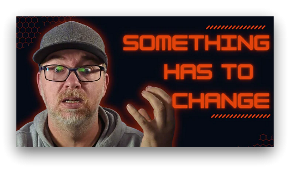 Having networked computers at home used to be called…well, having networked computers at home. As a description, it’s both accurate and boring, something that cannot be said about having a ‘homelab’.
Having networked computers at home used to be called…well, having networked computers at home. As a description, it’s both accurate and boring, something that cannot be said about having a ‘homelab’.
“A home lab, or simply lab,’ is a personal space where technology enthusiasts, professionals, and hobbyists can experiment with various hardware and software. From virtual machines to your own server, a home lab offers endless possibilities,” says Brandon Lee of VirtualizationHowto, one of many sites publishing tutorials aimed at the surging homelab scene.
David Burgess runs the DB Tech channel on YouTube, where he publishes tutorials on technologies relevant to homelabs and self-hosting in general, such as Docker, Portainer, Proxmox, and Pi-Hole, to name just a few. The almost universal common denominator among channels like David’s is the absence of piracy, because you can’t pirate software that developers happily give away for free.
To that background, a new video published on the channel was immediately puzzling.
Years-Old Videos Considered Non-Compliant
This week David received a notification from YouTube; unusual considering he’d turned off notifications two years ago when the frequency became overwhelming. Still, the communication from YouTube was important, since it referred to a community guideline strike on one of his videos.
Given that David has had a community strike on his account since March 29, 2021, he initially thought the message was about that. It wasn’t.
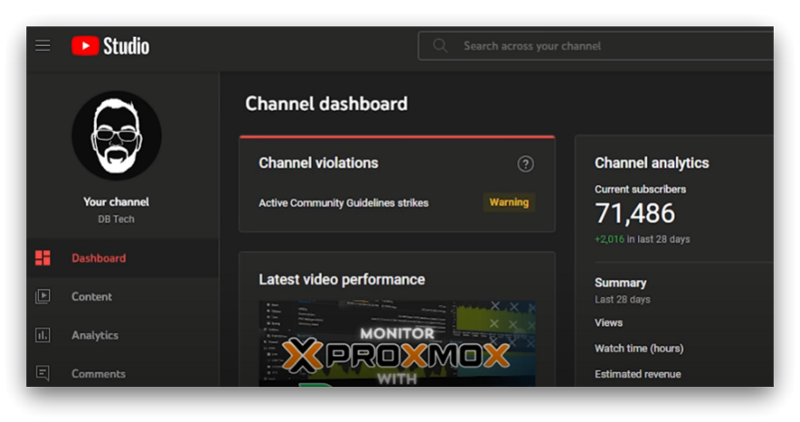
The background to the first strike is almost ancient history. On March 20, 2020, David uploaded a video about a Docker container for youtube-dl, software that allows people to download videos from YouTube and other platforms. Notably, the upload preceded the RIAA’s failed efforts to have youtube-dl removed from GitHub by six months.
While youtube-dl remains on GitHub today for anyone to download, on March 29, 2021, a year after its initial upload, YouTube notified David that his docker/youtube-dl video had been removed for violating YouTube’s Terms of Service. David filed appeals with YouTube, noting that he hadn’t promoted the tool for infringing purposes, but was ultimately informed that it would not be restored.
No specific reasons were given but YouTube’s terms of service state that downloading from the platform is not allowed. Even if YouTube had other issues in mind, the TOS violation can’t be avoided, despite David’s record of good conduct.
Disappointed to Receive a Strike
After speaking with David and reviewing his videos, it’s clear that YouTube and similar platforms aren’t focused on people like him when making the rules. He presents himself well, refrains from mindless hype, and produces clear educational videos that add value to the YouTube platform. The community strike is an obvious disappointment to him, beyond just getting a strike.
Since countless other videos remained up when his had been taken down, including many that blatantly promoted youtube-dl for infringing purposes, David still feels the deletion was somewhat unfair. As always, the context of the video is important, so while mindful of YouTube’s rule against downloading, we watched the whole thing in search of anything egregious.
No Obvious Crimes, Anti-Malware, Pro-Irony
What we found was a tutorial video in which David went out of his way to insist on careful use; certainly not by pirates downloading the latest music videos or people pilfering content for their own channels.
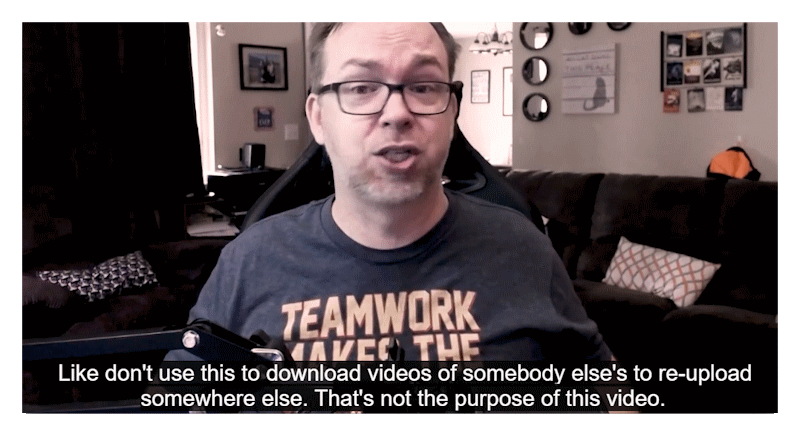
The video also devotes time to alternative tools that promise to download videos from YouTube, with the primary aim of giving users malware instead. As David explains, for YouTube creators who need to show a clip of another video within theirs for context, using youtube-dl is a safer option.
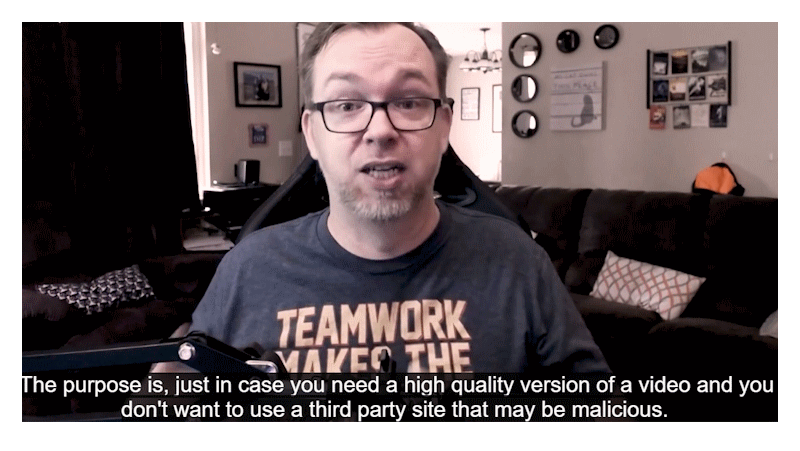
Even at this point, with context shining in David’s favor, downloading videos that aren’t already configured for download still isn’t allowed by YouTube. The RIAA firmly believes that using youtube-dl to obtain YouTube videos amounts to a violation of the DMCA, which disallows the circumvention of digital locks, including YouTube’s rolling cipher.
Under YouTube’s current terms of service, content that “shows viewers how to get unauthorized access to content, software, or services that usually require payment” is disallowed under to the ‘Digital security content’ section. That doesn’t seem to apply to YouTube directly in this case.
Anti-circumvention and the prevention of unauthorized access are the key principles overall. This makes the content that David downloaded from YouTube, as a demonstration in his now-removed video, much more than just a little ironic.
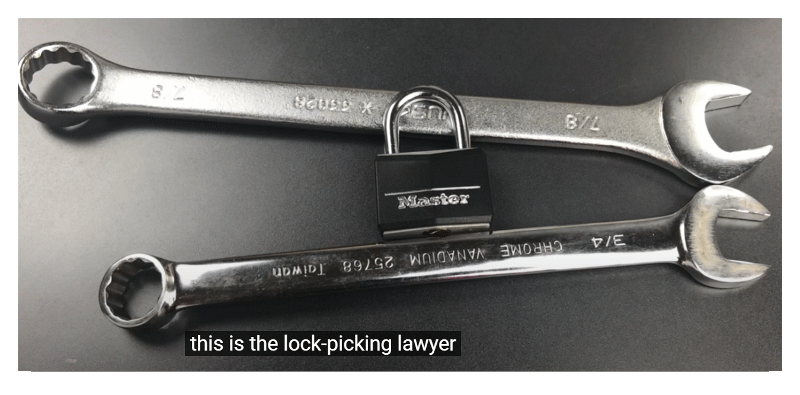
That brings us back to the community guidelines strike issued this week.
Arr..Arr..Arr..Agggh
On February 5, 2021, David uploaded several tutorial videos on how to create the ultimate home media server using Emby, Sonarr, Radarr and Jackett. One of those videos explained how to configure these pieces of software, especially how to get the Docker containers to communicate with each other; it was a technical tutorial about networking, nothing beyond that.
This week David discovered that specific video (but none of the others) had been removed for breaching YouTube’s terms of service. Once again, dozens of similar tutorials that go much further remain live on YouTube, for no immediately obvious reason. David’s video was uploaded over three years ago and had accrued 114,000 views, a figure that will never go up and never again earn him revenue on YouTube.
Some channels specialize in this kind of content for obvious reasons, yet somehow remain live. David says that causes confusion when trying to assess YouTube’s interpretation of the rules, and how other videos posted to his channel may be affected.
New Rules Present New Concerns
Over the years, YouTube’s approach to content has certainly become more restrictive. It’s generally not excessive but, as new rules are implemented, the chances of older content made under different rulesets falling foul only look set to increase. David believes that creators will have to adhere to today’s rules and then consider how future rules may step in to render previously acceptable content a TOS violation down the line.
“Now I have to put myself into a very conservative mindset about what might be misconstrued by the wrong content mod as a violation and take corrective action in the future because, again, who knows when something like this will happen again?” he says.
Guidelines, Rules, Laws
As societies react to new technologies, the shifting sands of social norms, and the effect of government efforts to legislate, regulate, or even frustrate online behavior, large online platforms like YouTube are being forced to change. New rules governing conduct are inevitable and can often provide clues on how a company hopes to be perceived among licensing partners and advertisers. As we recently suggested, personal moderation at scale is already an impossibility and with new rules come new problems.
David doesn’t have any plans to abandon YouTube but seems less inclined to rely on it exclusively moving forward. He’s hoping to continue building an audience on Patreon where $1 per month gets things started, and also on Rumble, according to a new post on X, where a lack of coherence on rules in general makes the place almost insufferable.
On the flip side, too many new rules have a tendency to breed even more rules of increasing complexity; read by the few and fully understood by almost nobody.
Reports this week published by Ars Technica and Techcrunch detailed new content policy at Twitch, implemented to make old policies on nudity less confusing.
The end result could give Monty Python’s Meaning of Life a run for its money.





